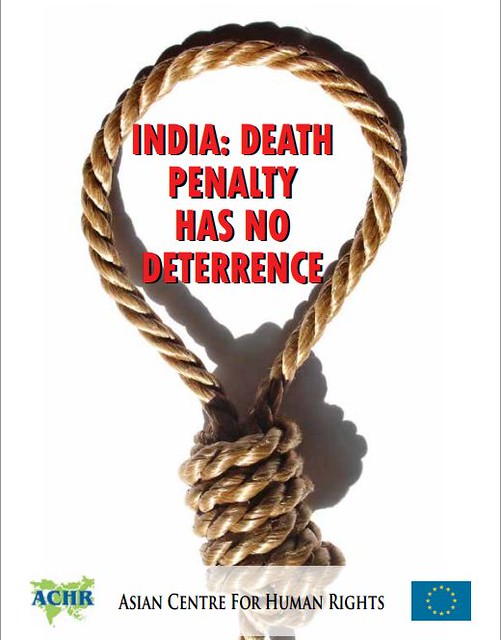By TwoCircles.net Staff Reporter,
New Delhi: Asian Centre for Human Rights, an NGO has analyzed 12 years (2000 to 2012) data published by National Crimes Records Bureau and concluded that despite no deterrent effect death penalty continues to be awarded by the Indian courts. It has inferred from the numbers that two people are sentenced to death every day in India.
The ACHR report, “India: Death Penalty Has No Deterrence”, prepared by Asian Centre for Human Rights states: “From 2001 to 2012, death sentence of 1,552 convicts were confirmed while the death sentences for 4,382 convicts were commuted to life imprisonment. This implies that a total of 5,934 convicts were given death sentence in the last 12 years in India i.e. about two convicts being given death sentence every working day of the judiciary”.

The report further states that President Pranab Mukherjee has rejected 97% of the mercy petitions since assuming the office of the President of India on 25 July 2012 despite no deterrent effect of death penalty.
President Mukherjee has considered 23 mercy pleas so far involving 31 death-row convicts out of which only one convict, Atbir was granted mercy as in August 2014.
“The empirical evidence of the Government of India, however, establishes that death penalty does not act as deterrent.” said Mr Suhas Chakma, Director of Asian Centre for Human Rights.
Even inclusion of death penalty for repeat offenders of rape under Section 376E of the Indian Penal Code following the Nirbhaya gang rape incident in Delhi has not reduced non-homicidal offences such as rape.
On 4 April 2014, a Sessions Court in Mumbai, Maharashtra first time in the country awarded death penalty to three repeat offenders of rape under the new Section 376E of the IPC in the infamous Shakti Mill rape case. However, the statistics provided by Mumbai Police showed that 135 rape cases were reported from April to 15 June 2014 i.e. about 2 rape cases daily.
Similarly, the award of death penalty to four adult accused found guilty of rape and murder of Nirbhaya by a fast track court in September 2013 failed to act as a deterrent. According to data released by the Delhi Police, 616 rape cases were registered in Delhi from 1 January 2014 to 30 April 2014 i.e. six cases were reported every day. This is an increase of 36% compared to around 450 cases registered in the same period in 2013.
The report also said though no convict under anti-terror laws from Jammu and Kashmir was executed since 1990 until the execution of Afzal Guru in 2013, the state recorded a “significant decline” in terror incidents, with 5,247 such reports in 1993 to 220 in 2012.
“Though death penalty does not act as a deterrent, the Government of India continues to mislead the people about its effectiveness. Death penalty can never be a substitute to prevention, effective and prompt investigation and speedy justice delivery system against crimes on which the Government of India has failed”, Mr Chakma added further.
Asian Centre for Human Rights called upon the Government of India to amend all the laws that provide death penalty and replace the same with punishment for life imprisonment i.e. imprisonment for the whole of the remaining period of the convicted person’s natural life.

